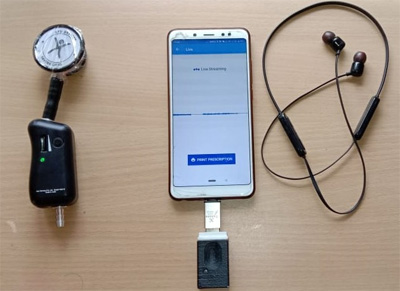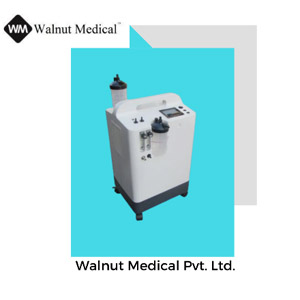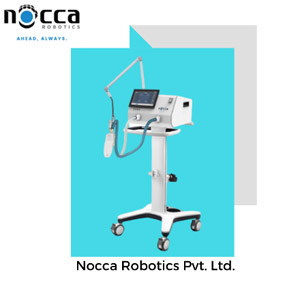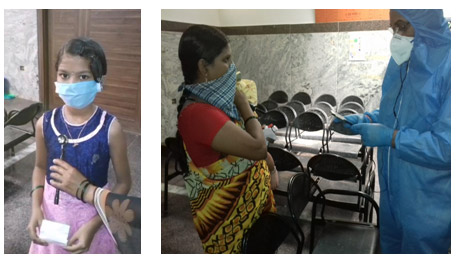 Can medial equipment be designed in a manner that can keep doctors safe and cater to unique emergency requirements of the COVID 19 crisis?
Can medial equipment be designed in a manner that can keep doctors safe and cater to unique emergency requirements of the COVID 19 crisis?
Several start-ups supported by the Department of Science and Technology (DST) are showing the way with stethoscopes that doctors can use without touching the patient, oxygen concentrator that can help the hospitals generate their in-house oxygen and portable and app controlled IoT based ventilator system.
Several Indian medical devices manufacturers and indigenous automation companies took up the pandemic as a challenge and came up with innovative designs of ventilators, portable respiratory aids or devices for contactless diagnosis and monitoring of the patients.
Department of Science and Technology (DST), Government of India through its Centre for Augmenting WAR with COVID-19 Health Crisis (CAWACH) initiative scouted, evaluated and supported promising ventilator, respiratory aids and other vital medical equipment from 5 companies who have now taken their products to deployment stage.
Ayu Devices incubated at Society for Innovation and Entrepreneurship (SINE), IIT Bombay in 2017 has developed a digital stethoscope that can help doctors listen to heart and lungs sounds while keeping at a safe distance from the patients. The device identify abnormal sounds and help diagnose patients. It is designed as a wireless module to enhance the bluetooth range and help it to be controlled from a distance. While existing digital stethoscope uses smartphone bluetooth, their device works with an additional bluetooth module to increase the range and consistency in the data. It is also, fitted with filters to remove external noise for clear sound making it usable in Indian clinical settings where there is lot of background noise in OPDs. This has enabled doctors to listen to chest sounds while covered in PPEs which is not possible with conventional stethoscope.
They are further scaling up the manufacturing to cater to the increasing need and have successfully commercialised the stethoscope for the telemedicine segment.
 A portable Oxygen Concentrator by Ambala based WALNUT MEDICAL helps hospitals generate oxygen in-house. It is an intelligent closed loop system which monitors oxygen level and gives enough oxygen to the patient as per the patient need. This is the first oxygen concentrator made in India and is fitted with automated oxygen flow technology which will prevent patient suffering from hyperoxia.
A portable Oxygen Concentrator by Ambala based WALNUT MEDICAL helps hospitals generate oxygen in-house. It is an intelligent closed loop system which monitors oxygen level and gives enough oxygen to the patient as per the patient need. This is the first oxygen concentrator made in India and is fitted with automated oxygen flow technology which will prevent patient suffering from hyperoxia.
DST’s timely support helped them push their endeavor forward with 5Ltr and 10Ltr oxygen concentrator models and oximeter as well. Manufacturing of oxygen concentrators requires huge moulds and the support helped them invest on quality moulds to compete against products from Japan, USA and China. IIT Delhi incubation team worked with them to help the technology see the light of the day.
Walnut Medical will be donating 50 Oxygen Concentrators to SC, ST and Gov hospitals by November end and then launch the product in the market.
 Pune based Nocca Robotics has developed a ventilator which operates in both invasive and noninvasive, pressure-controlled mode and solar powered with low wattage requirement. It works with medical airline and oxygen as well as ambient air and oxygen and has App based control and IoT enabled system.
Pune based Nocca Robotics has developed a ventilator which operates in both invasive and noninvasive, pressure-controlled mode and solar powered with low wattage requirement. It works with medical airline and oxygen as well as ambient air and oxygen and has App based control and IoT enabled system.
A smart ventilation system has been offered by Hyderabad based Aerobiosys Technologies. It is portable, cost-effective, IoT-enabled and powered by lithium ion batteries. It operates uninterrupted for 5 hours and is both invasive and non-invasive, with a smartphone app to control the device. The system displays a real-time information of the breath pattern and other critical lung parameters. It can attach to an oxygen cylinder and can operate on its own in ambient air.
Catering to heat diseases, Pune based Jeevtronics has developed a device called defibrillator that restores normal heartbeat by sending an electric pulse or shock to the heart. It is used to prevent or correct an arrhythmia, a heartbeat that is uneven or that is too slow or too fast. They have developed dual powered defibrillator (grid + hand cranked), as well a battery less defibrillator for sudden cardiac arrest.
 SINE, IIT Bombay is the implementation partner for the CAWACH program. Other eight incubation centers from different zones of India and the Indian STEPs and Incubators Association participated in call for applications, review and the selection process. The supporting Satellite centers are FIIT, IIT Delhi, SIIC, IIT Kanpur, HTIC, IIT Madras, Venture Centre, Pune, IKP Knowledge Park, Hyderabad, KIIT-TBI, Bhubaneswar.
SINE, IIT Bombay is the implementation partner for the CAWACH program. Other eight incubation centers from different zones of India and the Indian STEPs and Incubators Association participated in call for applications, review and the selection process. The supporting Satellite centers are FIIT, IIT Delhi, SIIC, IIT Kanpur, HTIC, IIT Madras, Venture Centre, Pune, IKP Knowledge Park, Hyderabad, KIIT-TBI, Bhubaneswar.
CAWACH Program has been steered by National Science and Technology Entrepreneurship Development Board (NSTEDB) of DST.
Dr. Anita Gupta, Head of NSTEDB said, “Bringing in special flexibility and speed in providing support was critical to the timely success of startups.”
DST Secretary Prof. Ashutosh Sharma added, “The present and clear challenges of COVID-19 brought an unprecedented synergy of efforts among academia, labs, startups, industry and government which allowed rapid extraordinary developments with a shared purpose. The lessons learned are being incorporated in the upcoming Science. Technology and Innovation Policy 2020.






























